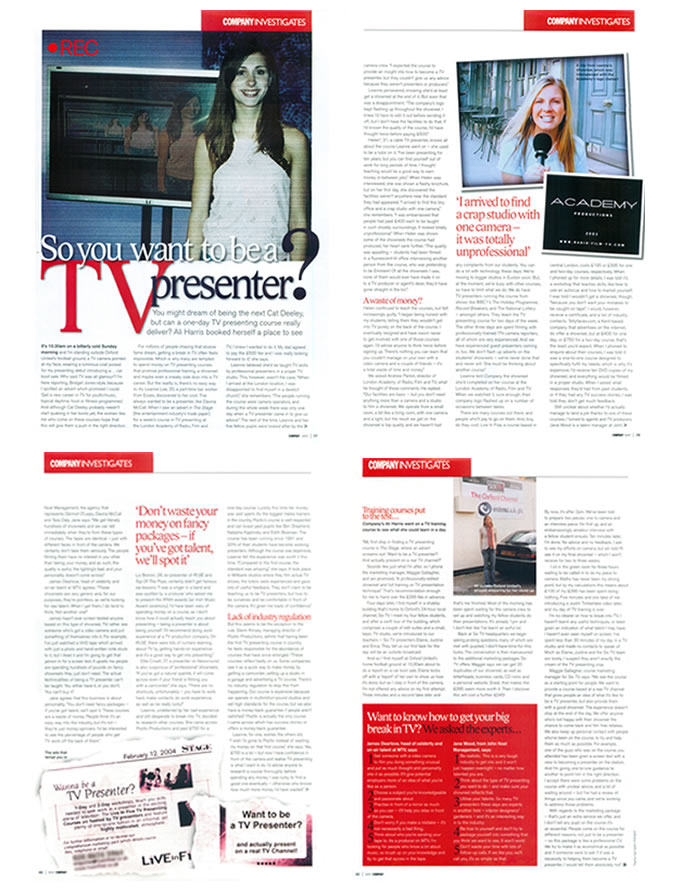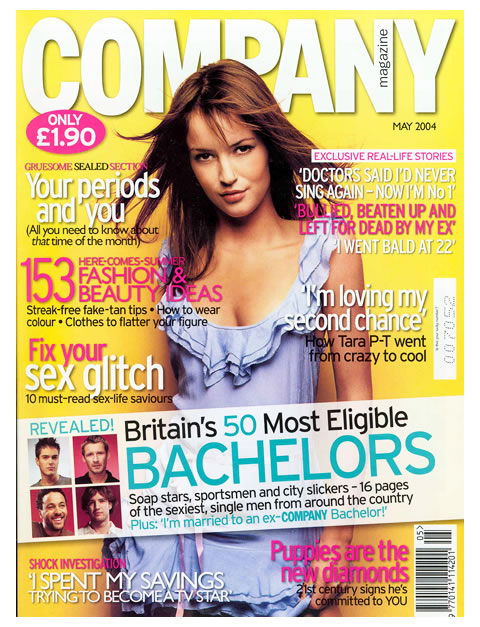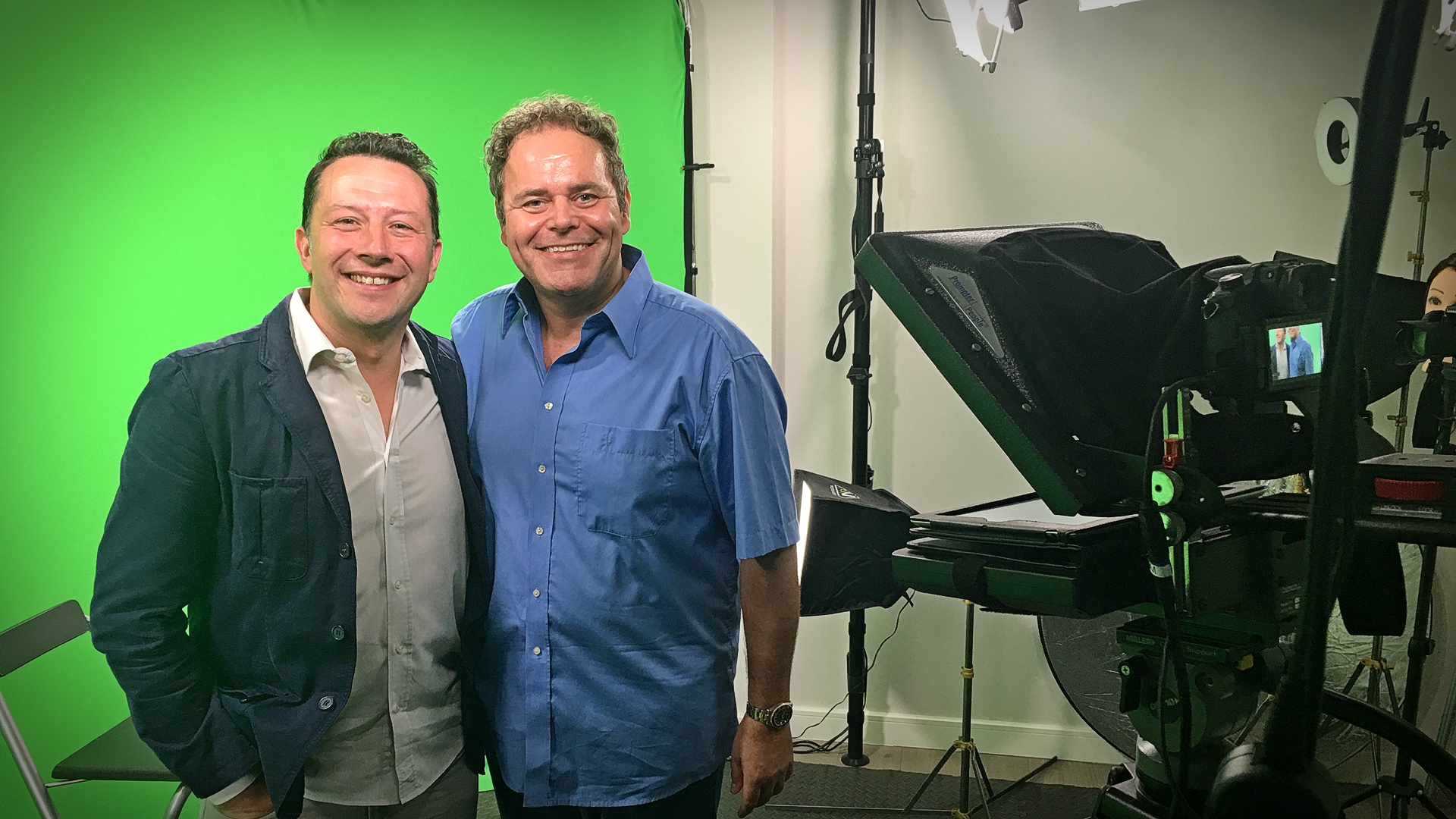In a scathing investigation of TV presenter courses in Company Magazine, Glenn Kinsey's course was the only one recommended by the article.
The magazine gave a comprehensive review of available training courses as well as getting feedback from industry agents and producers. Most courses faced fierce criticism for their lack of professional facilities and quality training, denouncing them as a "waste of money".
Well respected
However, when it came to Glenn's course, the magazine said, "Luckily, this time her money was well spent. As the biggest media trainers in the country, Pozitiv's course [led by Glenn Kinsey] is well-respected and can boast past pupils like Ben Shephard, Natasha Kaplinsky and Edith Bowman. The course has been running since 1991 and 20% of their students have become working presenters."
"Amazing standard"
The writer, Ali Harris, went on to say that, "Pozitiv is actually the only course I came across which has success stories or offers a money-back guarantee" and said that, compared to others, "the standard was amazing."
The full article text is below or you can view a PDF copy by clicking the link:
Company Magazine - 'So you want to be a TV presenter?' (924 KB)
So you want to be a TV presenter?
You might dream of being the next Cat Deeley, but can a one-day TV presenting course really deliver? Ali Harris booked herself a place to see
It's 1O.30am on a bitterly cold Sunday morning and I'm standing outside Oxford United's football ground, a TV camera pointed at my face, wearing a luminous coat poised for my presenting debut introducing a... car boot sale. Who said TV was all glamour? I'm here reporting, Bridget Jones-style, because I spotted an advert which promised I could 'Get a new career in TV for youth/music, topical daytime, food or fitness programmes'.
And although Cat Deeley probably needn't start quaking in her boots yet, the women like me who come on these courses hope that this will give them a push in the right direction.
For millions of people chasing that elusive fame dream, getting a break in TV often feels impossible. Which is why many are tempted to spend money on TV presenting courses that promise professional training, a showreel and maybe even a sneaky side door into a TV career. But the reality is, there's no easy way in. As Leanne Lee, 20, a part-time bar worker from Essex, discovered to her cost.
"I've always wanted to be a presenter, like Davina McCall. When I saw an advert in The Stage [the entertainment industry's trade paper] for a week's course in TV presenting at the London Academy of Radio, Film and TV, I knew I wanted to do it. My dad agreed to pay the £500 fee and I was really looking forward to it," she says. Leanne believed she'd be taught TV skills by professional presenters in a proper TV studio. This, however, wasn't the case.
"When I arrived at the London location, I was disappointed to find myself in a derelict church" she remembers. "The people running the course were camera operators, and during the whole week there was only one day when a TV presenter came in to give us advice." The rest of the time, Leanne and her five fellow pupils were looked after by the camera crew. "I expected the course to provide an insight into how to become a TV presenter, but they couldn't give us any advice because they weren't presenters or producers."
Leanne persevered, knowing she'd at least get a show reel at the end of it. But even that was a disappointment. "The company's logo kept flashing up throughout the showreel. I knew I'd have to edit it out before sending it off, but I don't have the facilities to do that. If I'd known the quality of the course, I'd have thought twice before paying £500."
I arrived to find a crap studio with one camera - it was totally unprofessional
Helen, 31, a cable TV presenter, knows all about the course Leanne went on - she used to be a tutor on it. "I've been presenting for ten years, but you can find yourself out of work for long periods of time. I thought teaching would be a good way to earn money in-between jobs".
When Helen was interviewed, she was shown a flashy brochure, but on her first day, she discovered the facilities weren't anywhere near the standard they had appeared. "I arrived to find this tiny office and a crap studio with one camera,' she remembers. "I was embarrassed that people had paid £400 each to be taught in such shoddy surroundings. It looked totally unprofessional."
When Helen was shown some of the showreels the course had produced, her heart sank further. "The quality was appalling - students had been filmed in a fluorescent-lit office interviewing another person from the course, who was pretending to be Eminem! Of all the showreels I saw, none of them would ever have made it on to a TV producer or agent's desk; they'd have gone straight in the bin."
A waste of money?
Helen continued to teach the courses, but felt increasingly guilty. "I began being honest with my students, telling them they wouldn't get into TV purely on the back of the course. I eventually resigned and have sworn never to get involved with one of those courses again. I'd advise anyone to think twice before signing up. There's nothing you can learn that you couldn't manage on your own with a video camera and a couple of friends - it's a total waste of time and money".
We asked Andrew Parkin, director of London Academy of Radio, Film and TV, what he thought of these comments. He replied: "Our facilities are basic - but you don't need anything more than a camera and a studio to film a show reel. We operate from a small room, a bit like a living room, with one camera and a light, but the result we get on the showreel is top quality and we haven't had any complaints from our students. You can do a lot with technology these days. We're moving to bigger studios in Euston soon. But, at the moment, we're busy with other courses, so have to limit what we do. We do have TV presenters running the course from shows like BBC1's The Holiday Programme, Record Breakers, and The National Lottery - amongst others. They teach the TV presenting course for two days of the week. The other three days are spent filming with professionally-trained ITN camera reporters, all of whom are very experienced. And we have experienced guest presenters coming in, too. We don't flash up adverts on the students' show reels - we've never done that and never will. She must be thinking about another course."
Leanne lent Company the showreel she'd completed on her course at the London Academy of Radio, Film and TV. When we watched it, sure enough, their company logo flashed up on a number of occasions between takes.
There are many courses out there; and people who'll pay to go on them. And, boy, do they cost. Live In Five, a course based in central London, costs £195 or £395 for one and two-day courses, respectively. When I phoned up for more details, I was told it's a workshop that teaches skills, like how to use an autocue and how to market yourself. I was told I wouldn't get a showreel, though, "because you don't want your mistakes to be caught on tape". I would, however, receive a certificate, and a list of industry contacts.
Tellyfaces.com, a Kent-based company that advertises on the internet, do offer a show reel, but at £400 for one day, or £750 for a two-day course, that's the least you'd expect. When I phoned to enquire about their courses, I was told it was a one-to-one course designed to specifically fulfil my needs, which is why it's expensive. I'd receive ten DVD copies of my showreel, and everything would be filmed in a proper studio. When I asked what responses they'd had from past students, or if they had any TV success stories, I was told they don't get much feedback.
Still unclear about whether I'd actually manage to land a job thanks to one of these courses, I turned to agents and TV producers. Jane Wood is a talent manager at John Noel Management, the agency that represents Dermot O'Leary, Davina McCall and Tess Daly. Jane says: "We get literally hundreds of showreels and we can tell immediately when they're from these types of courses. The tapes are identical - just with different faces in front of the camera. We certainly don't take them seriously. The people filming them have no interest in you other than taking your money, and as such, the quality is awful, the lighting's bad, and your personality doesn't come across."
James Dearlove, head of celebrity and on-air talent at MTV, agrees: "These showreels are very generic and, for our purposes, they're pointless, as we're looking for raw talent. When I get them, I do tend to think, Not another one!"
James hasn't ever screen-tested anyone based on this type of showreel, "I'd rather see someone who's got a video camera and put something of themselves into it. For example, I've just watched a VHS tape which arrived with just a photo and hand-written note stuck to it, but I liked it and I'm going to get that person in for a screen test. It upsets me people are spending hundreds of pounds on fancy showreels they just don't need. The actual technicalities of being a TV presenter can't be taught. You either have it, or you don't. You can't buy it".
Don't waste your money on fancy packages - if you've got talent, we'll spot it
Jane agrees that this business is about personality. "You don't need fancy packages - if you've got talent, we'll spot it. These courses are a waste of money. People think it's an easy way into the industry, but it's not - they're just money-spinners. I'd be interested to see the percentage of people who get TV work off the back of them".
Liz Bonnin, 28, ex-presenter of RI:SE and Top Of The Pops, certainly didn't get famous via lessons. "I was a singer in a band and was spotted by a producer who asked me to present the IRMA awards [an Irish Music Award ceremony]. I'd have been wary of spending money on a course, as I don't know how it could actually teach you about presenting - being a presenter is about being yourself. I'd recommend doing work experience at a TV production company. On RI:SE, there were lots of runners learning about TV by getting hands-on experience and it's a good way to get into presenting."
Ellie Crisell, 27, a presenter on Newsround, is also suspicious of 'professional' showreels. "If you've got a natural sparkle, it will come across even if your friend is filming you with a camcorder," she says. "There are no shortcuts, unfortunately - you have to work hard, make contacts, do work experience, as well as be really lucky!"
As the biggest media trainers in the country, Pozitiv's course [led by Glenn Kinsey] is well-respected and can boast past pupils like Ben Shephard, Natasha Kaplinsky and Edith Bowman. The course has been running since 1991 and 20% of their students have become working presenters
Leanne, undeterred by her bad experience and still desperate to break into TV, decided to research other courses. She came across Pozitiv Productions and paid £700 for a one-day course. Luckily, this time her money was well spent. As the biggest media trainers in the country, Pozitiv's course is well-respected and can boast past pupils like Ben Shephard, Natasha Kaplinsky and Edith Bowman.
The course has been running since 1991 and 20% of their students have become working presenters. Although the course was expensive, Leanne felt the experience was worth it this time.
"Compared to the first course, the standard was amazing," she says. It took place in Millbank studios where they film actual TV shows, the tutors were experienced and gave lots of useful feedback. They don't claim to be teaching us to be TV presenters, but how to be ourselves and be comfortable in front of the camera. It's given me loads of confidence".
Lack of industry regulation
But this seems to be the exception to the rule. Glenn Kinsey, managing director of Pozitiv Productions, admits that having been the first TV presenting course in the country, he feels responsible for the abundance of courses that have since emerged. "These courses reflect badly on us. Some companies see it as a quick way to make money by getting a camcorder, setting up a studio in a garage and advertising a TV course. There's no industry regulation to stop this from happening. Our course is expensive because we operate in multimillion-pound studios and set high standards for the course, but we also have a money-back guarantee if people aren't satisfied."
Pozitiv is actually the only course I came across which has success stories or offers a money-back guarantee... compared to other courses, the standard was amazing
Pozitiv is actually the only course I came across which has success stories or offers a money-back guarantee. Leanne, for one, wishes the others did.
"I wish I'd gone to Pozitiv instead of wasting my money on that first course," she says. Yes, £700 is a lot - but now I have confidence in front of the camera and realise TV presenting is what I want to do. I'd advise anyone to research a course thoroughly before spending any money. I was lucky to find a good one eventually - otherwise who knows how much more money I'd have wasted".
Training courses put to the test...
Company's Ali Harris went on a TV training course to see what she could learn in a day
"My first stop in finding a TV presenting course is The Stage, where an advert screams out: 'Want to be a TV presenter? And actually present on a real TV channel?'
Sounds like just what I'm after, so I phone the marketing manager, Maggie Gallagher, and am promised, "A professionally-edited showreel and full training on TV presentation technique." That's recommendation enough for me to hand over the £295 fee in advance. Four days later, I find myself in a shabby building that's home to Oxford's 24-hour local channel, Six TV. I meet my four fellow students, and after a swift tour of the building, which comprises a couple of edit suites and a small, basic TV studio, we're introduced to our teachers - Six TV presenters Elaine, Justine and Erica. They tell us our first task for the day will be an outside broadcast.
And so I find myself at Oxford United's home football ground at 10.30am about to do a report on a car boot sale. Elaine kicks off with a 'report' of her own to show us how it's done, but as I step in front of the camera, I'm not offered any advice on my first attempt. Three minutes and a second take later and that's me finished. Most of the morning has been spent waiting for the camera crew to set up and watching my fellow students do their presentations. It's already 1 pm and I don't feel like I've learnt an awful lot.
Back at Six TV headquarters we begin asking probing questions, many of which are met with puzzled, I-don't-have-time-for-this looks. The conversation is then manoeuvred to the additional marketing packages Six TV offers. Maggie says we can get 20 duplicates of our showreel, as well as letterheads, business cards, CD roms and a personal website. Great, that makes the £295 seem more worth it. Then I discover this will cost a further £245!
By now, it's after 2pm. We've been told to prepare two pieces: one to camera and an interview piece. I'm first up, and an embarrassingly amateur interview with a fellow student ensues. Ten minutes later, I'm done. No advice and no feedback. I ask to see my efforts on camera, but am told I'll see it on my final showreel - which I won't receive for two to three weeks.
I sit in the green room for three hours waiting to be called in to do my piece to camera. Maths has never been my strong point, but by my calculations this means about £100 of my £295 has been spent doing nothing. Five minutes and one take of me introducing a Justin Timberlake video later, and my day of TV training is over.
I'm no clearer on how to break into TV, I haven't learnt any useful techniques, or been given an indication of what talent I may have. I haven't even seen myself on screen. I've spent less than 30 minutes of my day in a TV studio, and made no contacts to speak of. Much as Elaine, Justine and the Six TV team are lovely, I suspect they aren't exactly the cream of the TV presenting crop.
Maggie Gallagher, course marketing manager for Six TV, says: "We see the course as a starting point for people. We want to provide a course based at a real TV channel that gives people an idea of what it's like to be a TV presenter, but also provide them with a good showreel. The experience doesn't stop at the end of the day. We offer anyone who's not happy with their showreel the chance to come back and film free retakes. We also keep up personal contact with people who've been on the course, to try and help them as much as possible. For example, one of the guys who was on the course you attended has been given a screen test with a view to becoming a presenter on the station. And I'm giving one-to-one guidance to another to point him in the right direction. I accept there were some problems on the course with unclear advice, and a lot of waiting around - but I've had a review of things since you came, and we're working to address those problems.
With regards to the marketing package - that's just an extra service we offer, and I don't tell any pupil on the course it's an essential. People come on the course for different reasons, not just to be a presenter - so this package is like a professional CV. We try to make it as economical as possible and if someone were to ask if it was a necessity to helping them become a TV presenter, I would tell them absolutely not".
© Company Magazine






